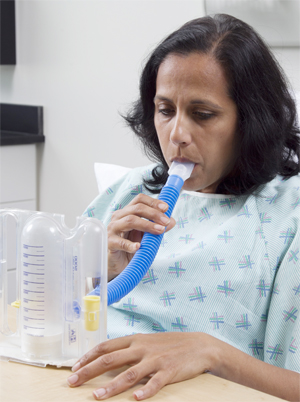Healthcare-Associated Pneumonia
Healthcare-Associated Pneumonia
Pneumonia is an infection in one or both lungs. It’s caused by germs, such as bacteria, viruses, and fungi. Some people develop pneumonia by coming in contact with germs in the course of daily life, such as at school, work, or the gym. This is sometimes called community-acquired pneumonia. Others develop pneumonia during a stay in the hospital. This is called hospital-acquired pneumonia.
And still others develop pneumonia following some type of contact with the healthcare system. A patient may have had recent medical treatments including:
Intravenous (IV) medicines including chemotherapy for cancer
Wound care
Hemodialysis for kidney disease
Or a person may:
Live in a nursing home or other long-term care facility
Have recently been in the hospital
This is called healthcare associated pneumonia (HCAP). It can be very serious since these people often have other medical conditions. And, the germs in healthcare facilities may be especially difficult to treat.
What are the risk factors for HCAP?
The following are risk factors for HCAP:
Age -- either very young or very old
Chronic lung disease or other serious health problems
Weak immune system from medicine or disease
Trouble swallowing, coughing, or clearing mucus from the throat or lungs
Trouble taking a deep breath
Tube feedings or receiving food through a tube into the stomach or small intestine
Taking certain medicines that may increase the growth of germs
Recent antibiotic therapy
Exposure to equipment or supplies that are not clean
What are the symptoms of HCAP?
Symptoms include:
Cough
Mucus that is green, yellow, or bloody
Fever and chills
Shortness of breath
Chest pain when breathing or coughing
Confusion
How is HCAP diagnosed?
Pneumonia can be hard to diagnose in people who are already ill. Signs and symptoms, physical exam, and changes on chest X-ray are used in the diagnosis. Blood tests and cultures of blood and lung secretions are used to identify the cause and help determine treatment.
How is HCAP treated?
Pneumonia caused by bacteria is treated with antibiotics. If there is no improvement in symptoms, healthcare providers look for other causes and then determine the best treatment. Other care includes:
Close monitoring
Supportive care includes providing supplemental oxygen, removing mucus from the lungs, and giving breathing treatments
What are the complications of HCAP?
Complications of HCAP include:
Recurrent hospitalization
Even more serious pneumonia
Other serious infections
Developing resistance to antibiotics; this means that the antibiotics don't work to fight HCAP or other infections.
How can HCAP be prevented?
Healthcare professionals should follow all policies and procedures to help prevent HCAP.
Handwashing. This is the single most important way to prevent the spread of germs. Healthcare workers should wash their hands or use an alcohol-based hand cleaner before and after treating each patient.
Limit the use of breathing machines. People who are on ventilators should be checked often to see if they are able to breathe without the ventilators.
Keep patients heads elevated. Any patient with trouble swallowing or on a ventilator should have his or her head elevated. This helps prevent bacteria, secretions, food, or liquids from getting into the lungs.
Careful use of antibiotics. Antibiotics should only be used when needed and for the shortest time possible. This helps prevent the growth of bacteria that are more harmful and harder to kill. Antibiotics should not be used to treat viruses.
Clean or sterile equipment or devices. All equipment and devices should be carefully cleaned or sterilized as recommended by the manufacturers.
Careful monitoring. Patients with feeding tubes, wounds, trouble swallowing, or other factors that increase the risk of HCAP are closely monitored.
Preventing HCAP: What patients can do
Patients and family members should do the following.
Ask all hospital staff to wash their hands. Don’t be afraid to speak up!
Wash your own hands often with soap and water. Or use an alcohol-based hand cleaner.
Keep the head of the bed raised.
Do any breathing exercises your healthcare provider suggests. A simple breathing device called an incentive spirometer can help you take deep breaths.
Walk if you can. Walking helps your lungs stay clear.
Talk with your healthcare provider about what vaccinations you need.
Tips for good handwashing
Follow these steps:
Use warm water soap. Rub your hands together.
Clean the whole hand, under your nails, between your fingers, and up the wrists.
Wash for at least 15 to 20 seconds.
Rinse, letting the water run down your fingers, not up your wrists.
Dry your hands well. Use a paper towel to turn off the faucet and open the bathroom door.
Using alcohol-based hand cleaners
Alcohol-based hand cleaners are also a good choice when soap and water aren't available. Follow these steps:
Spread about a tablespoon of cleaner in the palm of one hand.
Rub your hands together briskly, cleaning the backs of your hands, the palms, between your fingers, and up the wrists.
Rub until the cleaner is gone and your hands are completely dry.
When to call your healthcare provider
Call your healthcare provider if you have any of the following:
Trouble breathing
Chest pain
Chills or a fever
Cough
For severe symptoms, call 911 right away.
If you have any questions or concerns about HCAP, or your risk of developing it, talk with your healthcare provider.
Updated:
September 04, 2017
Sources:
Risk factors and prevention of hospital-acquired and ventilator associated pneumonia in adults, Up To Date, Up To Date. Treatment of hospital-acquired, ventilator-associated pneumonia in adults
Reviewed By:
Blaivas, Allen J., DO,Fetterman, Anne, RN, BSN,Image reviewed by StayWell art team.
